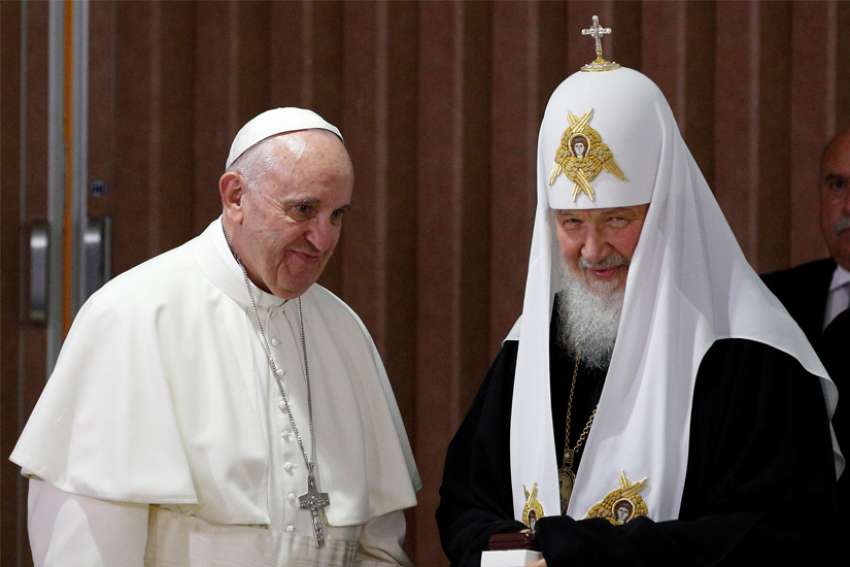It may seem counterintuitive for Christians to pray for direct, eye-to-eye contact between the head of the world’s largest Orthodox Church and the unifying pastor of the world’s 1.3 billion Catholics. While Francis begs for peace, Kirill has blessed Russia’s war in Ukraine. When two leaders are not in unity with each other, can they be an instrument of unity for others?
The mid-September meeting in Nur Sultan, Kazakhstan, at the Congress of World and Traditional Religions, would have been their first since an encounter in Cuba in 2016, and their first since Russia invaded Ukraine in February of this year. Pope Francis hopes to visit Ukraine on his way to the congress in Kazakhstan.
Ukrainians, including Byzantine Rite Ukrainian Catholics, are not happy about Pope Francis meeting with Kirill. They know Kirill has called Mr. Putin’s long tenure a miracle of God and has characterized the war, which has rained missiles on train stations, schools, farms and homes, as a just defense against negative and liberal influences introduced by ‘gay pride.’ Francis believes that Ukraine has had a cruel and senseless war inflicted upon it.
It is commonly agreed that the war has strained relations between the Roman Catholic Church and the Russian Orthodox Church. It’s no surprise the Russian Orthodox Church is more aligned with the interests of the Russian state. Pope Francis has warned that Kirill risks becoming Vladimir Putin’s “altar boy.” There is no empire on earth, Russian or otherwise, that can accommodate the Church of Pope Francis, or the Church of Christ.
We don’t live in an ideal world. Francis and Kirill are the instruments of unity the Church has right now. As they dialogue on possible ways and means by which Russia and Ukraine might live side-by-side, they may show the world a path to peace. It will be up to political leaders to successfully agree to terms that would resolve this tragic war.
Christians throughout the world are keenly aware that these men and the Churches they lead are also divided over the Eucharist. We remember that the Eucharist is the Sacrament of Unity. Their mutual presence to each other is how the Church can confront the serious scandal of division.
Would that they were able to break the one bread of Eucharist together and share the one cup. This would represent a much more significant presence both to one another and to a watching world. And the Eucharist can only be in service of peace. Indeed, eucharistically united, their combined presence and unified voice would instill an even greater measure of hope. They would be speaking and acting undivided, with one mind and one heart. All Catholics and Orthodox should strengthen their prayer in search of the fulfillment of John’s Gospel 17:21, that “they all may be one.”
Sin does overshadow us. An historic meeting of these leaders is left incomplete by our eucharistic division. But we believe in the power and presence of grace in every human encounter. This allows us to be devoted optimists and true disciples of hope. Any meeting between Kirill and Francis would remind us that while the Church is sinful it is also holy. It is in this holiness we are called to place our deepest hope and pray that we will not be disappointed.
So can a meeting, in the midst of war, between disunited leaders, be a sign of unity? Yes, especially whenever the power and presence of grace is acknowledged.
Fr. MacPherson is a Franciscan Friar of the Atonement in Graymoor, New York who hails from Cape Breton Island. He has had a long career in ecumenical work, including a decade spent working in ecumenism for the Archdiocese of Toronto.


